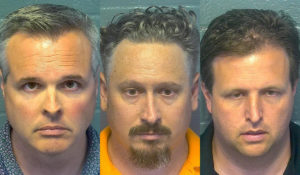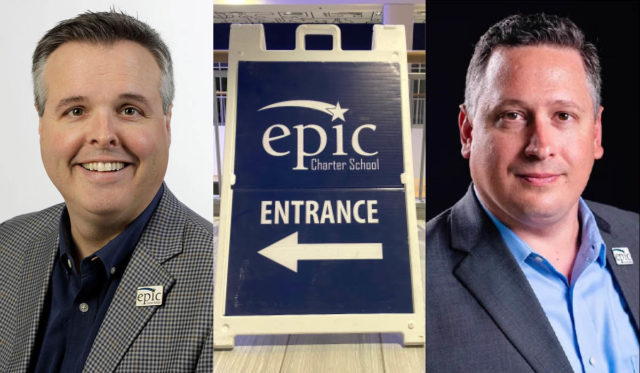
Two weeks before former Epic Charter Schools founders Ben Harris and David Chaney were arrested and charged with racketeering, conspiracy, embezzlement and other crimes, both men donated $375,000 on June 8 to a federal political action committee called Protect Our Freedoms, which had been formed 10 months earlier but had not received a single donation up to that point.
Within nine days, that Super PAC dispersed $581,000 to two other Super PACs: $300,000 to a national committee called American Values First, and $281,000 to Truth PAC, an Oklahoma committee. Both committees are run by Campaign Advocacy Management Professionals (CAMP), a leading campaign firm founded by Fount Holland, a former newspaper reporter who has become arguably the top Republican political consultant in Oklahoma by mastering the art of both candidate campaigns and independent expenditure efforts.
By the conclusion of Oklahoma’s June 28 primary election, the two PACs orchestrated by CAMP and funded by Harris and Chaney had spent hundreds of thousands of dollars in opposition to State Auditor & Inspector Cindy Byrd, who completed the damning audit of Epic Charter Schools that eventually led to Harris and Chaney’s prosecution.
Hundreds of thousands of dollars also were spent in support of Byrd’s opponent, Steve McQuillen, who did not run a campaign himself. Despite more than $500,000 of Harris and Chaney’s money being used to attack Byrd and support McQuillen, Byrd won reelection with more than 70 percent of the vote.
Holland said he remembers speaking with Harris about the independent expenditures, but he said he does not remember what Harris said motivated his PAC donations.
“I don’t really recall what the intent is,” Holland said. “We don’t ask people. They ask us to run — to be a vendor. We oblige in many cases, occasionally we don’t.”
Holland said “people are innocent until proven otherwise,” and he noted that a prior multi-county grand jury had investigated Harris and Chaney without returning indictments.
“You assume the best of people. Yes. I believed it was private funding. I believe it was their personal money and, again, I don’t know. I can’t recall all the details,” Holland said. “I make a rule, I don’t deal with public money. I’ve done as much as I can to stay away from that, so that is something that I asked before I agreed to do the work.”
CAMP chief operating officer Matthew Parker said he was told Harris and Chaney’s motivation was to “defeat Cindy Byrd.”
“I’m not ashamed of the work we did there,” Parker said.
‘You follow the dots, it’s a direct line’
Harris and Chaney’s recent independent expenditure contributions aimed at retribution against Byrd underscore the political influence that Epic’s controversial founders attempted to sow by donating heavily in state and federal campaigns for years, even as they were under criminal investigation for allegedly embezzling money through Epic Youth Services, the private charter management company they co-owned.
“You follow the dots, and it’s a direct line,” former State Auditor & Inspector Gary Jones said during a June 24 press conference about the dark money. “Now we know for certain (…) it’s not individuals giving money. It’s our own tax dollars.”
Jones filed a formal complaint with the Oklahoma Ethics Commission regarding Harris, Chaney, Holland and others, but Harris and Chaney’s cascade of political donations began long before this year’s election cycle.
For state-level candidates and committees between 2015 and 2021, Harris made about $104,296 in political contributions. During the same time, Chaney made about $101,800 in contributions to state campaigns, according to information on the Oklahoma Ethics Commission website. Josh Brock, Epic’s former chief financial officer who was charged along with Harris and Chaney, donated $13,700 to state candidates.
In the June arrest affidavit for Harris, Chaney and Brock, Oklahoma State Bureau of Investigation special agent Mark Drummond outlined many of the donations and payments the trio made to Oklahoma politicians and powerbrokers, stoking questions about the extent of the three men’s influence on politics and policy in the state.
“Chaney, Harris, Brock and other [Epic Youth Services / Epic-related parties] made numerous political donations, some of which were paid with Chaney’s AMEX card,” Drummond wrote in the affidavit. “As previously noted, Chaney’s card was partially paid from the ‘Student Learning Fund.'”
‘This is so much bigger than two men and a charter school’
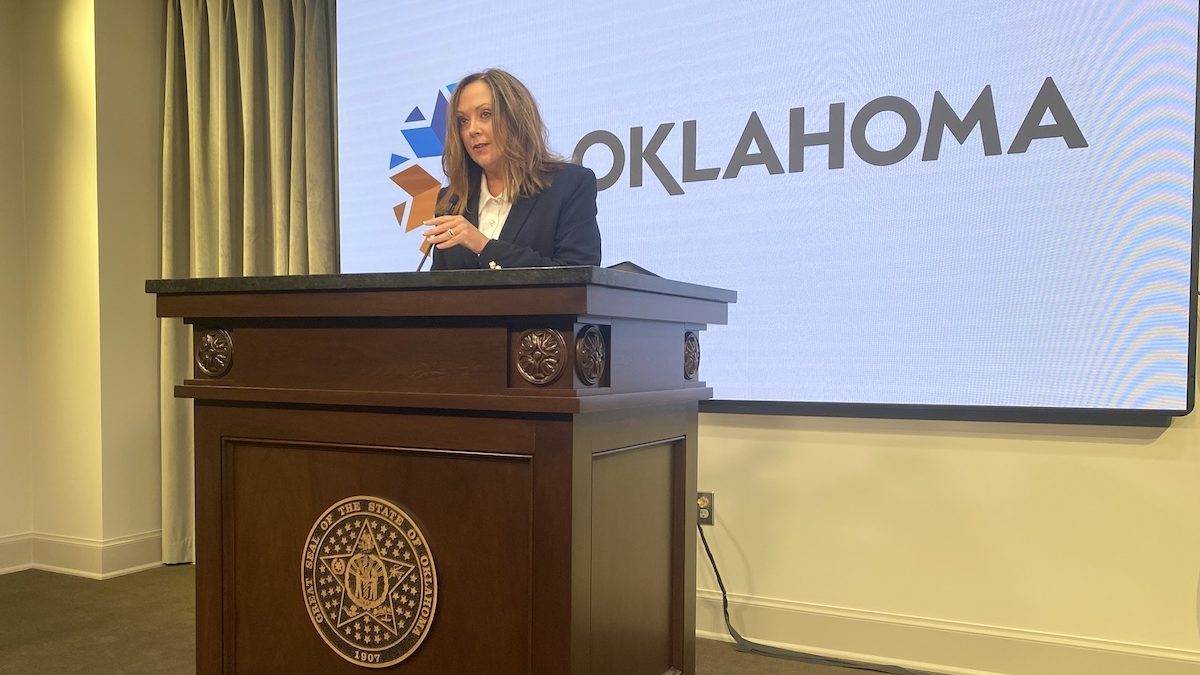
During a press conference held by Byrd on June 23, the afternoon of the arrests, she outlined vendors with ties to Harris and Chaney that received payments for services irrelevant to the operations of a school.
Byrd also discussed how “Student Learning Fund” money was used for personal expenses, as well as accusations of the student Learning Fund credit card being tied to efforts to discredit her investigative audit released in October 2020. (The audit revealed that Epic owed the state millions of dollars related to excessive administrative costs and the co-mingling of public funds with Epic California, a separate entity launched by Harris and Chaney in 2016.)
“Chaney used the student Learning Fund credit card to make a $100,000 donation to [the Oklahoma Council of Public Affairs] during the time frame of the audit’s release,” Byrd said during the press conference. “This is so much bigger than two men and a charter school. Harris and Chaney have used funds meant for students’ education to control and manipulate elections and public policy in this state.”
RELATED
Epic charges: Ben Harris, David Chaney, Josh Brock arrested for ‘complicated criminal enterprise’ by Tres Savage and Megan Prather
However, some legislators have said the influence Chaney, Harris and Brock are believed to have had has been blown out of proportion.
“I think it’s greatly exaggerated,” said Senate President Pro Tempore Greg Treat (R-OKC). “They weren’t nearly as involved as the narrative seems to be, or at least from my perspective. To the extent that parents can have control over their kids’ education, that is something I obviously believe deeply in, and a lot of parents in my district took advantage of the opportunity that Epic provided, as well as other alternatives.”
Treat, who was initially elected to the state Legislature in 2011 and authored the controversial Oklahoma Empowerment Act bill this legislative session, said he believes he received a check from Chaney in 2016 because Epic’s headquarters resided in his Senate District. According to the Oklahoma Ethics Commission website, Treat received a $2,700 donation from Chaney in October 2016.
Treat said they had a good meeting about his belief in giving parents control over their kids’ education. Speaking on July 10, Treat said he had not read the arrest affidavit, which is embedded below.
“I do believe if people scammed the state or did anything illegal they need to be held accountable to the fullest extent of the law,” Treat said.
Oklahoma County District Attorney David Prater charged Harris, Chaney and Brock with 11 criminal counts, including racketeering, conspiracy to commit a felony, six counts of embezzlement of state funds, obtaining money by false pretense, violation of the Oklahoma Computer Crimes Act and submitting false documents to the state.
Harris and Chaney were released from Oklahoma County Jail hours after their arrest on $250,000 bonds. According to OSCN, Harris’s bond was paid by Bobby Stem, an Epic Charter Schools board member from 2010 until about 2014 who also served as the longtime lobbyist for Epic Youth Services, a private company co-owned by Harris and Chaney that received millions of dollars for managing the charter schools.
‘Nothing to see here’
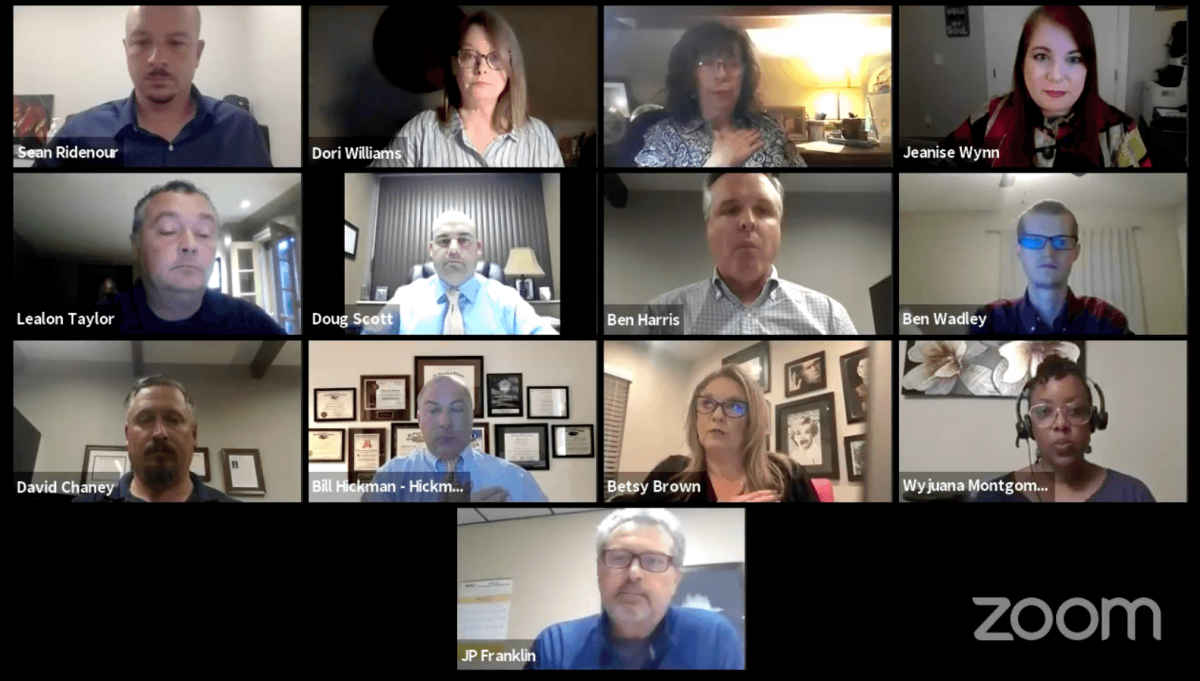
The affidavit states that between 2014 and 2020, numerous statewide elected officials and legislators received campaign contributions from Harris, Chaney and Brock.
Those who received money from the trio included a wide range of influential politicians:
- Gov. Kevin Stitt
- Lt. Gov. Matt Pinnell
- State Superintendent of Public Instruction Joy Hofmeister
- Former Attorney General Mike Hunter
- Then-Sen. Stephanie Bice
- Rep. Chris Kannady
- Former Gov. Mary Fallin
- House Common Education Committee Chairwoman Rhonda Baker
- House Appropriations and Budget Chairman Roger Thompson
- Sen. Paul Rosino
- Senate President Pro Tempore Greg Treat
- Sen. Kim David
- Rep. Sean Roberts
- Rep. Terry O’Donnell
- Rep. Tammy West
- Rep. Todd Russ
- Rep. Kevin West
- Rep. Ayshia (Ajay) Pittman
- Rep. Cyndi Munson
Between 2015 and 2021, Harris made about $104,296 in political contributions, and Chaney made about $101,800 in contributions, according to information on the Oklahoma Ethics Commission website. Brock made about $8,100 in contributions to State Superintendent of Public Instruction Joy Hofmeister’s reelection campaign in 2018 and $5,600 in donations to Rep. Preston Stinson’s election campaign in 2020.
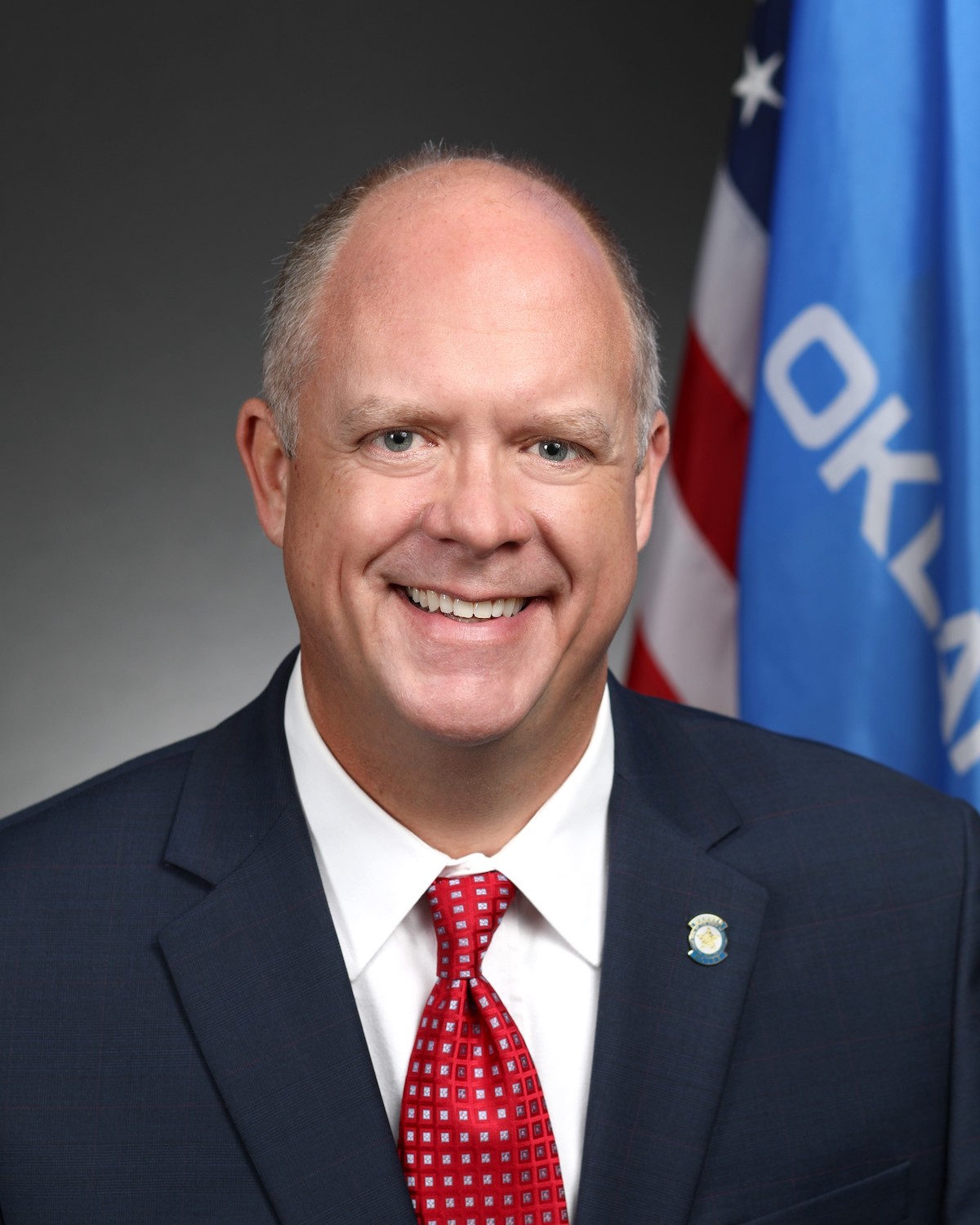
Stinson (R-Edmond) already had a personal connection to Harris, Chaney and Epic. In an interview with NonDoc, Stinson said he was asked by Harris in 2016 to serve on the governing board for Epic California.
“I said ‘sure,’ and at that time there had already been investigations and what not going on,” Stinson said. “I asked him, ‘Just shoot me straight here, is there anything sketchy going on? Because if there is, I can’t be involved in that.'”
Stinson said Harris assured him there was nothing “sketchy” taking place with the Epic California endeavor and that McAffee & Taft, along with other law firms, had assisted in setting things up. Stinson served on the Epic California board for three years, during which he reviewed a couple of contracts with Epic California and Panola Public Schools, a school district in rural southeastern Oklahoma to which Epic tried to bring their blended learning model in 2017. (Panola ended its relationship with Epic in 2020.)
“It was a volunteer deal,” Stinson said. “I never received a nickel of compensation for it.”
However, Stinson’s trajectory shifted in April 2020 when someone approached him and suggested he run for an Oklahoma House of Representatives seat being vacated by term-limited Rep. Lewis Moore (R-Arcadia). Stinson said once he decided he was going to run for office, he contacted Harris to ask if he would support the campaign and to let Harris know that he would be resigning from the Epic California board.
“I got campaign contributions from Ben, I got campaign contributions from David, and I got campaign contributions from Josh,” Stinson said. “I can tell you that they made campaign contributions, I think, because they thought that I was a smart and capable person. There was never any kind of a suggestion that I was going to be doing anything in their favor.”
Stinson ended up being absent for a large portion of the 2021 legislative session for health reasons. He said his communication with Harris was extremely limited during his first session, but when Rep. Sheila Dills (R-Tulsa) pushed forward a bill regarding charter school reform during the last week of session, Stinson said he called Harris to get a better understanding of the proposed policy in HB 2966.
“He went into some details and explained to me this piece and that piece and whatever,” Stinson said. “He kind of shrugged it off and said, ‘You know, it’s probably not something I’d be a supporter of, but it’s not really that big of a deal one way or the other to me.’”
Stinson ended up being only one of 17 House members who voted against HB 2966, which proposed requirements and procedures for program and financial audits, policies that would require charter schools to be subject to the same academic standards as Oklahoma’s traditional public schools, and a requirement to promptly notify a charter sponsor of any significant adverse actions, material findings of non-compliance, pending actions, claims or proceedings relating to a charter school or educational management company.
Of the 17 House members who voted against the bill, 12 received campaign contributions from Harris, Chaney and/or Brock:
- Rep. Chad Caldwell (R-Enid)
- Rep. Ross Ford (R-Broken Arrow)
- Rep. Tommy Hardin (R-Madill)
- Rep. Chris Kannady (R-OKC)
- Rep. Mark Lepak (R-Claremore)
- Rep. Jim Olsen (R-Roland)
- Rep. Sean Roberts (R-Hominy)
- Rep. David Smith (R-Arpelar)
- Rep. Jay Steagall (R-Yukon)
- Rep. Kevin Wallace (R-Wellston)
- Rep. Kevin West (R-Moore)
- Rep. Preston Stinson (R-Edmond).
“People can draw a bunch of inferences if they want to, but there really is generally nothing to see here on my side,” Stinson said. “I never talked to anybody. Never heard from any of the OSBI people. Never heard from any of the grand jury people. I’ve never heard from anybody about any of this. Everything I know about it, I know when you guys report it.”
A review of Federal Election Commission data shows that Chaney, Harris and Brock also made several campaign contributions to candidates for federal office, including:
- Current U.S. Senate candidate T.W. Shannon;
- Retiring U.S. Sen. Jim Inhofe
- Former President Donald Trump
- U.S. Rep. Stephanie Bice
- U.S. Rep. Tom Cole
- Former candidate for U.S. House Clark Jolley
- Current Oklahoma Supreme Court Justice Dustin Rowe when he ran for Congress in 2021;
- Congressional candidate Mike Thompson
- Congressional candidate Fred Morgan
- Congressional candidate Cathy Keating
‘A paid contractor for an alleged criminal enterprise’
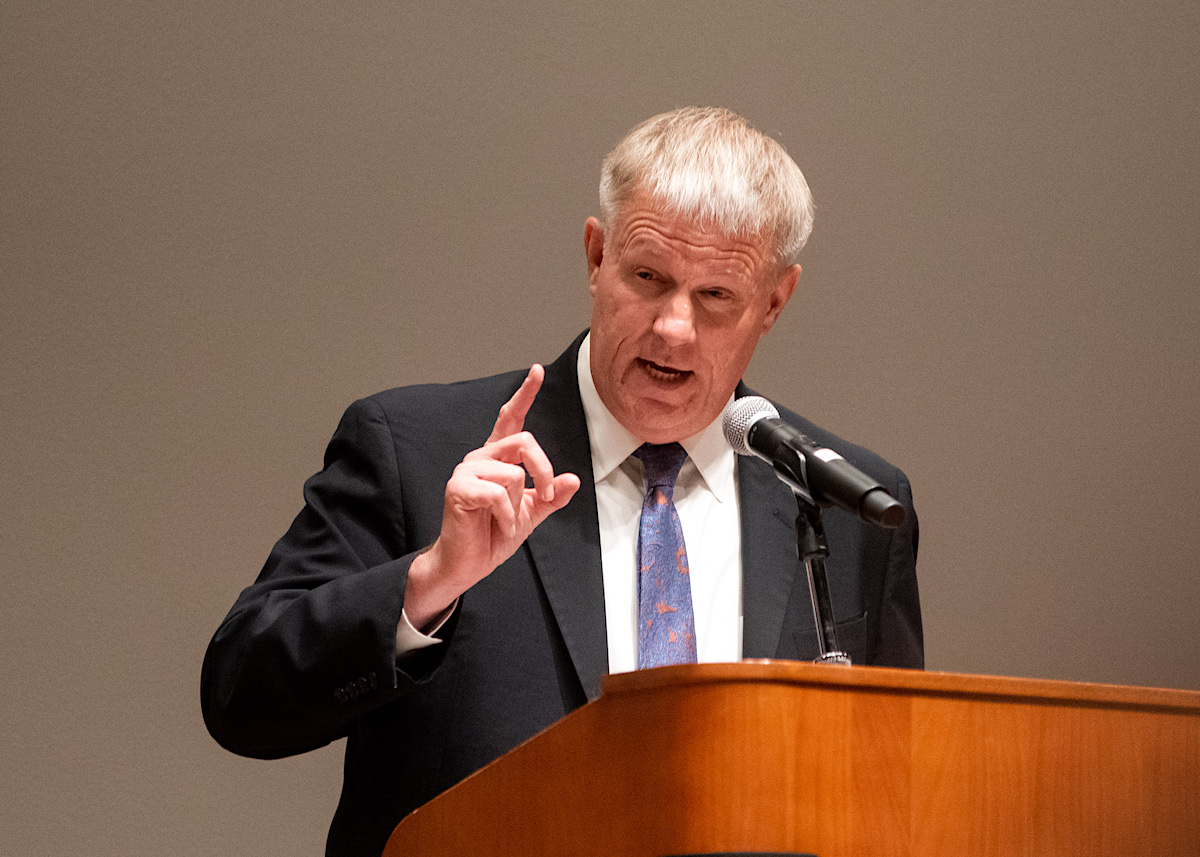
The probable cause affidavit states Harris and his wife made $5,600 in donations to Sen. Paul Rosino’s campaign in 2020 — two days after the state auditor released the Epic audit. During the 2021 legislative session, Rosino authored SB 895, which sought to allow state agencies to hire outside auditing firms. The bill also would have allowed entities audited by the State Auditor & Inspector’s Office to have a response of equal length be included in the final audit report. Rosino strongly rebuked claims that his bill had been influenced by Harris.
The affidavit also states that Chaney and Harris used their “financial and political resources” to impede the re-election effort of former Sen. Ron Sharp (R-Shawnee). Sharp, a former educator who had served as vice chairman of the Senate Education Committee, had been a vocal critic of Epic for drawing funding away from traditional public schools.
The current governing board of Epic Charter Schools, which voted to cut ties with Harris and Chaney at a meeting in May 2021, approved a motion at its July 2022 meeting to settle a lawsuit with Sharp.
Epic had sued Sharp in December 2019 for libel and slander owing to the senator’s criticisms and claims that the schools had inflated student enrollment numbers and misused taxpayer dollars.
Oklahoma County District Court Judge Cindy Truong had dismissed the lawsuit in February 2020, later fining Epic $500,000 under the Oklahoma Citizens Participation Act, which outlines sanctions for filing meritless lawsuits. Epic had previously planned to appeal the fine with the Oklahoma Supreme Court until the board voted to drop the appeal to the lawsuit at its March meeting.
Connections to the Epic co-founders are being questioned in the upcoming Republican runoff election for Oklahoma County district attorney, as well.
In a press release from June 24, GOP candidate and current Assistant District Attorney Gayland Gieger questioned whether a $10,000 payment by Epic Youth Services to Oklahoma County Commissioner and Oklahoma County district attorney candidate Kevin Calvey for legal services involved taxpayer money. Gieger also questioned whether the payment was made before, during or after Calvey supported charter school legislation when he was a member of the Oklahoma House of Representatives from 2014 to 2018.
“Mr. Calvey was a paid contractor for an alleged criminal enterprise,” Gieger said. “Voters deserve to know when he received personal compensation — before, during or after his time defending Epic Charter Schools as a representative.”
Calvey told The Oklahoman in June that he could not discuss the reason for the payment two or three years ago owing to attorney-client privilege.
“However, I can assure you, it had nothing to do with the criminal charges they now face,” Calvey told The Oklahoman. “When I am district attorney, I will, of course, recuse myself from the (Harris, Chaney and Brock) case and hand it back to the Attorney General’s Office.”
Follow @NonDocMedia on:
‘Ghost students’ and a shell company
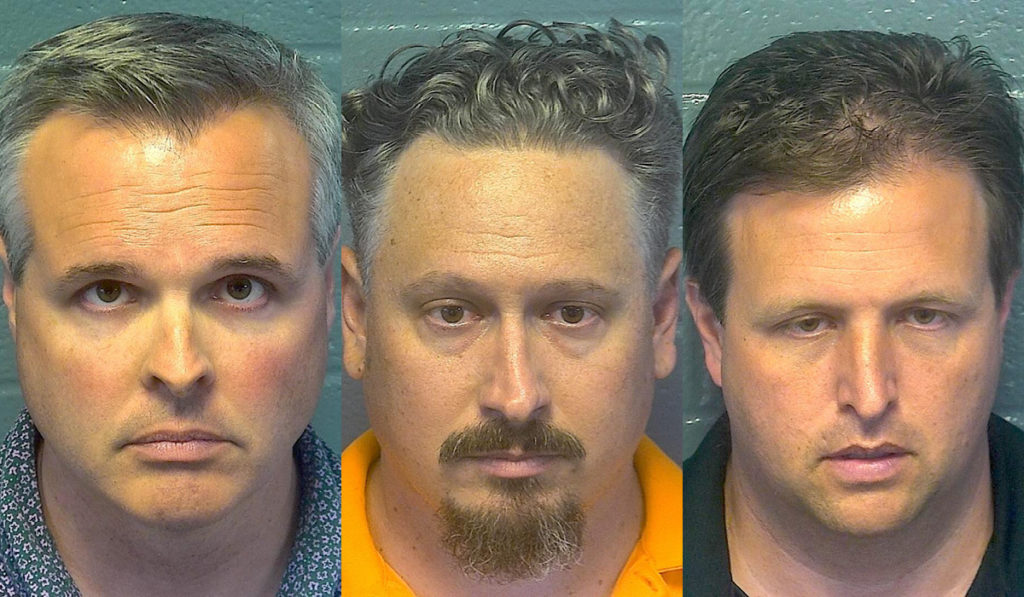
The affidavit provided other revelations regarding the financial crimes taking place within what was once the state’s largest public school district, including major salaries for administrative staff who were friends of Harris and Chaney, as well as the creation of a shell company aimed at obscuring the finances of Epic Youth Services.
“The administration for Epic boasted some of the highest paid school administrative salaries in the state of Oklahoma,” the affidavit states. “Most of the upper-level administration consisted of either family or personal friends of Chaney, Harris or Brock. Chaney and Harris convinced the administration through salary and bonuses to promote the recruitment of students by using teachers and current students to grow the school and increase their administrative fee.”
The affidavit also outlines the enrollment of “ghost students.”
“Epic’s recruitment/bonus payment concept led to teachers at private schools becoming teachers for Epic and simultaneously enrolling their private school students as public school students at Epic,” the affidavit states. “The teachers were then paid by both entities. In emails obtained during the investigation between Chaney and Epic staff members, Chaney condoned and authorized dual enrollment of students. These students came to be known as ‘ghost students.'”
A separate investigative report released by the State Department of Education in June, a few days prior to the arrests, showed that Epic may still be doing business with a company that has ties to Epic Youth Services, Chaney, Harris and Brock.
During a press conference, OSDE legal counsel Brad Clark said Epic was using a computer algorithm that stopped students from being unenrolled after extended absences. However, state law requires a virtual charter school to withdraw a student who is absent from school for 15 consecutive days and not on pace.
The algorithm appeared to have been built by Futuristic Education, a Newkirk-based company owned by Gregory Scott, a computer programer who was named in the arrest affidavit as a “related party” and “high risk vendor.” Scott is the brother of former Epic Schools Board Chairman Doug Scott, who resigned May 26, 2021, during the same meeting that the board voted to sever ties with Epic Youth Services, Harris, Chaney and Brock.
At its June 2021 meeting, the Epic Charter Schools Board approved an approximate $2.5 million contract with Futuristic Education.
Read full Epic affidavit
 Loading...
Loading...
(Editor’s note: Tres Savage contributed to this story by conducting interviews.)
(Correction: This article was updated at 9:15 a.m. Wednesday, Aug. 3, to correct reference to who voted against HB 2966 in 2021 and to correct reference to a congressional candidate.)










